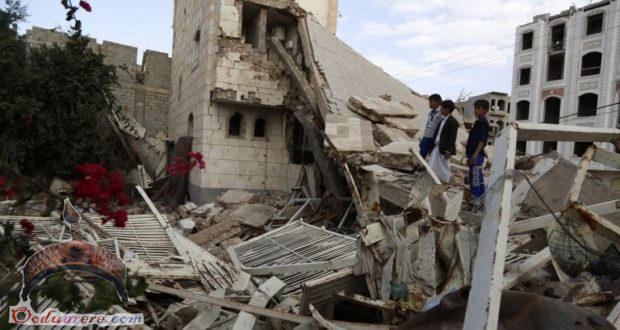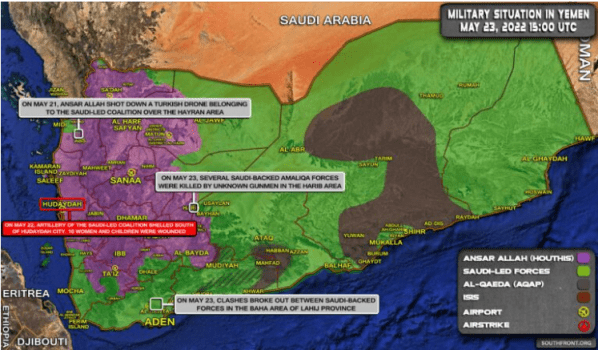According to the report of Eye for Humanity, in the last seven years of the Yemen war, bombings carried out by the Saudi-led coalition have killed 17,734 people and injured close to 30,000. According to its data, at least 4,017 deaths were of children
Originally published by Peoples Dispatch
Data released by the Yemen-based Eye for Humanity Centre for Rights and Development claims that at least 643 Yemeni civilians were killed in 2022, out of over 3,000 casualties recorded. This is despite last year seeing an unprecedented six-month-long ceasefire and a significant drop in fatalities. The war in Yemen will complete eight years in 2023.
The data shows that the total fatalities recorded last year included at least 102 children and 27 women. At least 353 children and 97 women were also injured in this period.
The Saudi Arabia-led international coalition also destroyed over 14,300 homes, 12 hospitals, 64 schools, and 22 power stations in Yemen last year, furthering the suffering of millions of Yemenis.
According to the UN, the six-month-long ceasefire led to a 60% decrease in casualties and a total of 159 Yemeni civilians were either killed or injured due to landmine blasts or other explosions in Houthi-controlled areas and elsewhere during that period.
According to the Eye for Humanity report, in the last seven years of the Yemen war, bombings carried out by the Saudi-led coalition have killed 17,734 people and injured close to 30,000. According to the data, at least 4,017 deaths were of children.
Blockade causes a massive humanitarian crisis
Bombings as well as the blockade imposed by the Saudi-led coalition have severely affected the situation of common Yemenis. According to the International Committee of the Red Cross (ICRC), more than 70% of Yemenis are now dependent on some kind of humanitarian aid, with the country’s health infrastructure working at half its capacity leaving millions of Yemenis vulnerable.
According to the Sanaa-based government, under the Houthis, the war and blockade imposed by the Saudi coalition are responsible for killing 16% of all premature babies in the country. Health Minister Taha Moutawakil claimed last month that at least “80 newborn babies die every day due to the lack of medical equipment and medicines” amid the blockade imposed on Yemeni people.
Moutawakil claimed that Yemen currently has about 600 incubators against the need for at least 2,000. The lack of incubators leaves a large number of newborn babies in Yemen susceptible to death.
The Saudi-led coalition has imposed a comprehensive land, sea, and air blockade of Yemen since 2015, purportedly to prevent the supply of weapons. However, the blockade prevents the inflow of essential supplies including food and medicines to Yemen, which is heavily dependent on imports.
The blockade was partially relaxed during the six-month-long ceasefire. However, the Houthis had demanded its complete lifting as the basis for extending the ceasefire, which the Saudis rejected.
According to UNICEF, as a result of almost eight years of war, the child mortality rate in Yemen has become the highest in the Arab world with over 60 deaths per 1,000 births. According to it, the figure of newborn babies dying every day in Yemen is almost double what the government claims. UNICEF has reported that nearly 52,000 newborn babies are dying each year in Yemen, an average of at least 142 per day.
UNICEF issued a report last month claiming that around 11,000 Yemeni children have been either killed or maimed due to the war in the country. It claimed that more than 2.2 million Yemeni children, a quarter of them under the age of five, are malnourished.
 Ọmọ Oòduà Naija Gist | News From Nigeria | Entertainment gist Nigeria|Networking|News.. Visit for Nigeria breaking news , Nigerian Movies , Naija music , Jobs In Nigeria , Naija News , Nollywood, Gist and more
Ọmọ Oòduà Naija Gist | News From Nigeria | Entertainment gist Nigeria|Networking|News.. Visit for Nigeria breaking news , Nigerian Movies , Naija music , Jobs In Nigeria , Naija News , Nollywood, Gist and more









